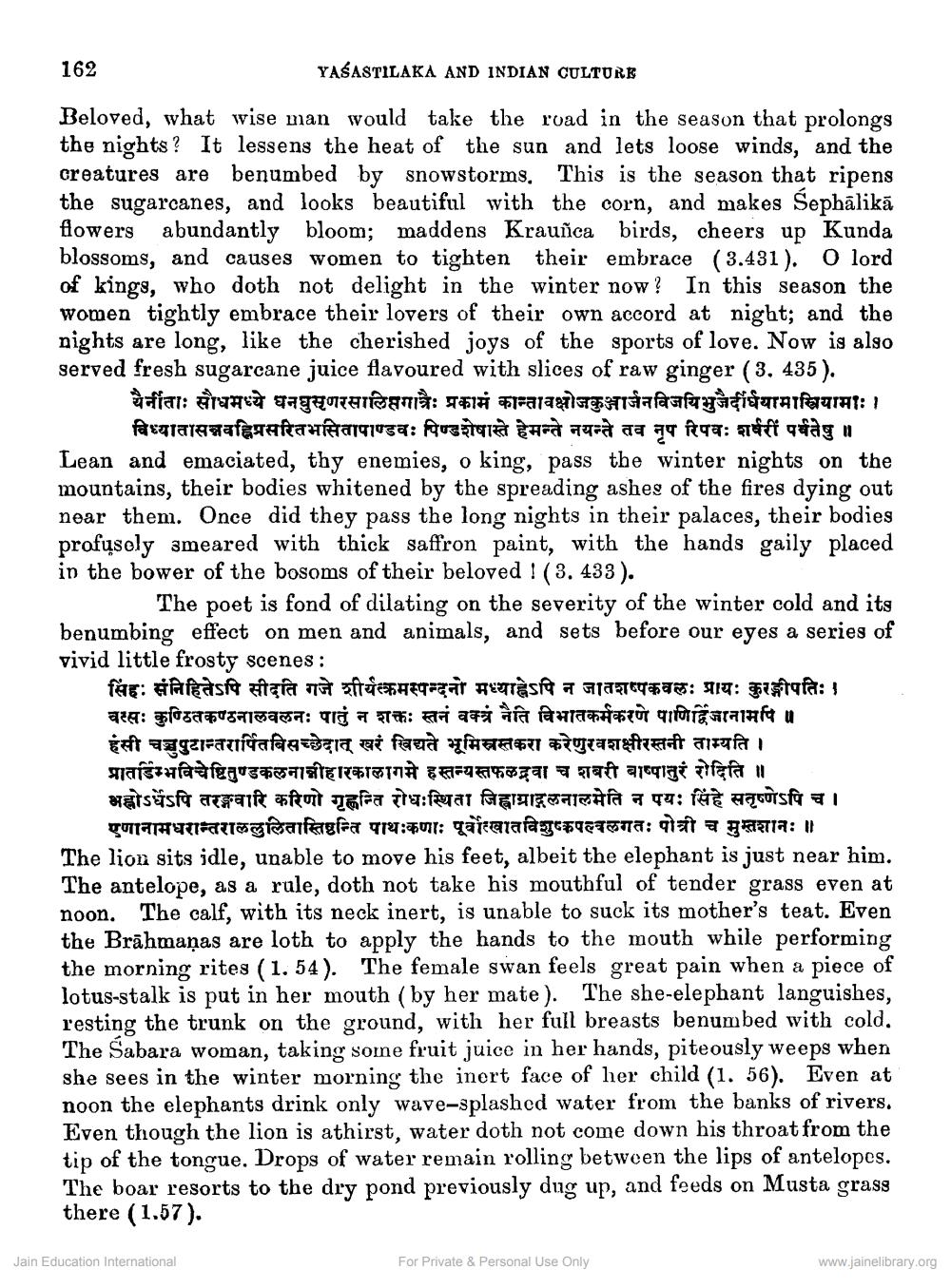________________
YASASTILAKA AND INDIAN CULTURE
Beloved, what wise man would take the road in the season that prolongs the nights? It lessens the heat of the sun and lets loose winds, and the creatures are benumbed by snowstorms. This is the season that ripens the sugarcanes, and looks beautiful with the corn, and makes Sephalikā flowers abundantly bloom; maddens Krauñca birds, cheers up Kunda blossoms, and causes women to tighten their embrace (3.431). O lord of kings, who doth not delight in the winter now? In this season the women tightly embrace their lovers of their own accord at night; and the nights are long, like the cherished joys of the sports of love. Now is also served fresh sugarcane juice flavoured with slices of raw ginger (3. 435).
àefiaı: Àrancà aagyozensanık: 7616 azaragdagendafaafayàcidara1faq171: / विध्यातासन्नवह्निप्रसरितभसिता पाण्डवः पिण्डशेषास्ते हेमन्ते नयन्ते तव नृप रिपवः शर्वरीं पर्वतेषु ॥
162
Lean and emaciated, thy enemies, o king, pass the winter nights on the mountains, their bodies whitened by the spreading ashes of the fires dying out near them. Once did they pass the long nights in their palaces, their bodies profusely smeared with thick saffron paint, with the hands gaily placed in the bower of the bosoms of their beloved! (3. 433).
The poet is fond of dilating on the severity of the winter cold and its benumbing effect on men and animals, and sets before our eyes a series of vivid little frosty scenes:
सिंहः संनिहितेऽपि सीदति गजे शीर्यत्क्रमस्पन्दनो मध्याह्नेऽपि न जातशष्पकवलः प्रायः कुरङ्गीपतिः । वरसः कुण्ठितकण्ठनालवलन: पातुं न शक्तः स्तनं वक्त्रं नैति विभातकर्मकरणे पाणिर्द्विजानामपि ॥ हंसी चान्तरार्पितबिच्छेदात् खरं खिद्यते भूमिस्रस्तकरा करेणुरवशक्षीरस्तनी ताम्यति । प्रातडिम्भविचेष्टितुण्डकलनान्नीहारकालागमे हस्तन्यस्तफलद्भवा च शबरी बाष्पातुरं रोदिति ॥ अह्नोऽर्धेऽपि तरङ्गवारि करिणो गृह्णन्ति रोधः स्थिता जिह्वाग्राद्गलनालमेति न पयः सिंहे सतृष्णेऽपि च । gmnatantansgiðanfagfa q12:401: qäktarafàgesterona: dâ a gama: 1
The lion sits idle, unable to move his feet, albeit the elephant is just near him. The antelope, as a rule, doth not take his mouthful of tender grass even at noon. The calf, with its neck inert, is unable to suck its mother's teat. Even the Brahmanas are loth to apply the hands to the mouth while performing the morning rites (1. 54). The female swan feels great pain when a piece of lotus-stalk is put in her mouth (by her mate). The she-elephant languishes, resting the trunk on the ground, with her full breasts benumbed with cold. The Sabara woman, taking some fruit juice in her hands, piteously weeps when she sees in the winter morning the inert face of her child (1. 56). Even at noon the elephants drink only wave-splashed water from the banks of rivers. Even though the lion is athirst, water doth not come down his throat from the tip of the tongue. Drops of water remain rolling between the lips of antelopes. The boar resorts to the dry pond previously dug up, and feeds on Musta grass there (1.57).
Jain Education International
For Private & Personal Use Only
www.jainelibrary.org




